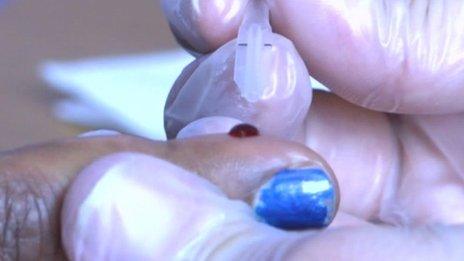UK law passes sales of HIV home tests before they exist
- Published

Kits allowing people to test themselves for HIV at home can be bought over the counter in the UK for the first time - but no kits exist yet in Britain.
The change in the law means it is now legal for people to test and diagnose themselves at home.
Previously, people could carry out tests they ordered online at home and send away their results, but were diagnosed over the phone.
It is hoped the move will help the UK's 25,000 undiagnosed HIV-positive people.
No tests have yet been developed that pass European guidelines, said the government's health regulator.
Home testing for HIV was approved by the government last September but the law only came into effect on Sunday.
The Terrence Higgins Trust HIV charity said the tests could be introduced into the UK this year or in early 2015.
The UK is leading Europe in making the kits available over the counter, but they were introduced to the US in 2012.
Testing could involve taking a small drop of blood from a finger, or a swab from the inside of the mouth.
'Key strut' of HIV prevention
Dr Michael Brady, medical director at the Terrence Higgins Trust, said it was a "shame" the change in the law was coming into effect when no viable tests were available.
The charity recently ran a scheme where participants were able to test themselves at home, send the results away by post and then receive a diagnosis over the phone, or by text message, if negative.
Dr Brady said: "What we had not anticipated was just how popular the scheme would be, with demand very nearly outstripping supply on more than one occasion."
The trust found that 97% of 915 users in its study said they would use the HIV self-sampling again. The charity said that in one weekend it received 3,000 orders for the test.
He said such feedback indicated home testing would form a "key strut" of the charity's prevention work in the UK.
But Dr Brady added: "It [home testing] is not for everyone, which is why it is important to have a range of options available."
He said it was important for users to access NHS facilities such as counselling and treatment if they found out at home they were HIV-positive.
'Convenient and discreet'
A spokesperson for the Department for Health said: "The stigma surrounding HIV may mean that some people are afraid or reluctant to go to a clinic to be tested.
"The change in the law will mean self-test kits are now legal to buy, making the test process more convenient and discreet."
She said although no kits meeting European standards were available in the UK, the government "expected this to change" in the next year.
"HIV testing remains free on the NHS - anybody with concerns can visit their GUM Clinic, GP or contact the Terrence Higgins Trust's confidential helpline. Self-sampling kits are also available to buy," she added.
Online tests 'unreliable'
Heather Leake Date, HIV specialist pharmacist and spokesperson for the Royal Pharmaceutical Society, said the tests would help reduce the risk of new HIV infections.
She said: "HIV self-testing kits may help increase diagnosis by providing more choice for people who have been at risk but are reluctant to get a test in person from existing services."
Ms Leake Date said kits currently available online could be unreliable and give "false results".
She added: "When kits become available, people should buy from a trusted source and check for the CE mark, which means it will have been assessed for quality and safety."
- Published20 March 2014
- Published24 November 2013
- Published29 November 2013